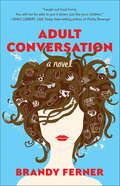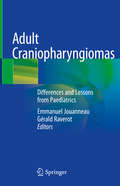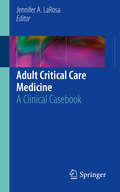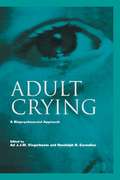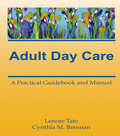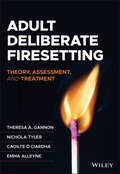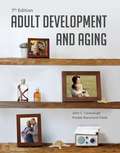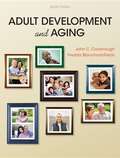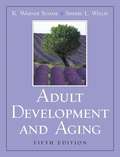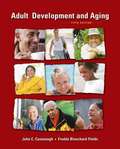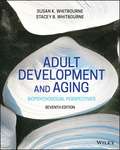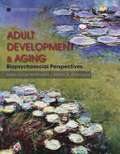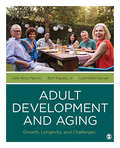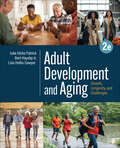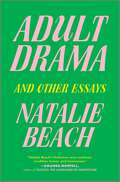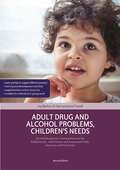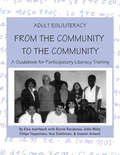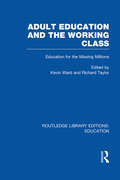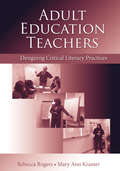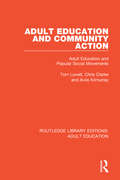- Table View
- List View
Adult Continuing Education and High School Course Catalog
by The Hadley School for the BlindThe mission of The Hadley School for the Blind is to promote independent living through lifelong distance education programs for individuals who are blind or visually impaired, their families and blindness service providers. Hadley offers courses free of charge to its blind and visually impaired students and their families and affordable tuition courses to blindness professionals. The Adult Continuing Education Program(ACE) offers a variety of courses that cover topics ranging from Braille and academic studies to independent living, life adjustment, technology, business and employment skills and recreation. The High School Program(HS) features academic courses and electives for students who seek to earn a high school diploma. Students can earn high scholl credit, which is easily transferred to their local schools, or earn a diploma through Hadley.
Adult Conversation: A Novel
by Brandy FernerApril is a thoughtful yet sarcastic mother of two who tries her best to be a caring, connected mom in a middle-class culture where motherhood has become relentless. April rages at modern motherhood’s impossible pressures, her husband’s “Dad privilege,” and her kids’ incessant snack requests. She wants to enjoy motherhood, but her idealist vision and lived experience are in constant conflict with one another. Is she broken—or is motherhood? Desperate for an answer, she seeks out a therapist, and lands with an unexpected woman whose validation and wisdom gives April the clarity to reclaim herself and even start designing clothes—her pre-motherhood passion. But when the ever-elusive babysitter cancels last-minute, April finds herself back at square one. She seeks guidance, but her therapist is now dealing with her own crumbling marriage—and instead of counseling April, she convinces her to speed off to Las Vegas with her to help catch her husband cheating. With a little weed, alcohol, and topless pool hopping, plus a male stripper and some much-needed autonomy, the two find lost pieces of themselves that motherhood swallowed up. But neither one is prepared for how tested—and tempted—they will be, or for the life-altering choices their journey will force them to make. Who is guiding whom anymore?
Adult Craniopharyngiomas: Differences and Lessons from Paediatrics
by Emmanuel Jouanneau Gérald RaverotThis volume focuses on adult craniopharyngiomas, offering various perspectives. The first part of the book provides an up-to-date overview of the pathogenesis and management of adult craniopharyngiomas, helping readers understand the pathogenesis and molecular pathways. It highlights the importance of animal models for addressing molecular keys and for developing targeted therapies. The second part deals with clinical management, detailing the latest results in the era of endoscopic surgery, including the major contribution of the extended nasal endoscopic approaches for suprasellar and retrochiasmatic tumors. The book also discusses the key aspects of these tumors and how to manage them. The last part of the book addresses the future therapies and recurrences after surgery and radiotherapy. This volume is of interest to neurosurgeons, endocrinologists, paediatricians, radiologists and oncologists.
Adult Critical Care Medicine: A Clinical Casebook
by Jennifer A. LaRosaThis clinical casebook provides a comprehensive yet concise state-of-the-art review of adult critical care medicine. Presented in a case-based format, each case focuses on a scenario commonly encountered with an adult patient in the ICU. Case scenarios include management of seizures and acute intracranial hypertension, sepsis, liver failure, brain death, bleeding and thrombosis, and treating hospital acquired infections in the ICU. Written by experts in the field, Adult Critical Care Medicine: A Clinical Casebook is a valuable resource for critical care specialists and practitioners who treat adult patients in critical care settings.
Adult Crying: A Biopsychosocial Approach
by Ad J.J.M. Vingerhoets Randolph R. CorneliusCrying is a typical human expression of emotion. Surprisingly, until now little scientific attention has been devoted to this phenomenon. Many textbooks on emotion fail to pay attention to it, and in scientific journals there are hardly any contributions focusing on this behavior. In contrast, there is much interest from the lay public, allowing pseudo-scientists to formulate theories that have little or no scientific basis. Is there any evidence in support of statements that crying is healthy or that not crying may result in toxification? How do people react to the crying of others? Is crying important for the diagnosis of depression, and if so, how? This book aims to fill this gap in scientific literature. Crying is discussed from several perspectives and specific attention is given to methodological issues and assessment. Each chapter provides a review and a summary of the relevant scientific literature.
Adult Day Care: A Practical Guidebook and Manual
by Lenore A Tate Cynthia M BrennanIntended for long-term care providers, consumers, and gerontology students, this valuable new guidebook and manual encourages the promotion and enhancement of adult day care as an essential link in long-term care. Since the early 1970s, the number of adult day care centers in the United States has grown from 20 to more than 620. This rapid increase in adult day care programs indicates that it is an important health care and social resource that has begun to fill a necessary gap in the long-term care system. To further meet the increasing needs, this new book provides information regarding the history, definition, and concept of adult day care; models of care; scope of activities; state and national policy; and samples of forms and reports needed for daily operations.
Adult Deliberate Firesetting: Theory, Assessment, and Treatment (Wiley Series in Forensic Clinical Psychology)
by Theresa A. Gannon Nichola Tyler Caoilte Ó Ciardha Emma AlleyneADULT DELIBERATE FIRESETTING Explore the theoretical foundations of—and discover effective treatment options for—adults who deliberately set fires In Adult Deliberate Firesetting: Theory, Assessment, and Treatment, a team of distinguished researchers deliver a comprehensive exploration of individuals who intentionally set fires. The book covers major theories on the motivations and processes involved in firesetting, as well as the assessment and treatment of patients and clients who demonstrate this behaviour. The treatment portion of the book focuses on a strengths-based rehabilitative approach that rests on the assumption that criminogenic and human needs are inextricably intertwined. Readers will find common challenges faced by practitioners in recruiting and facilitating group-based treatment for people who have set fires. Readers will also benefit from the inclusion of: A thorough introduction to deliberate firesetting, including its definitions, terms, and labels Comprehensive explorations of the key characteristics and clinical features of people who deliberately set fires Practical discussions of theories of deliberate firesetting, including effective psychological theory and typological explanations of firesettings In-depth examinations of best practice risk assessments in defendants, and patients who deliberately set fires Perfect for psychology researchers and practitioners, Adult Deliberate Firesetting: Theory, Assessment, and Treatment will also earn a place in the libraries of psychiatrists, forensic psychologists, social workers, and others involved in the assessment and treatment of adults.
Adult Development And Aging
by Fredda Blanchard-Fields John CavanaughWritten within a bio-psychosocial framework, Cavanaugh and Blanchard-Fields' best-selling book covers the specific ages-stages of adult development and aging. In its unparalleled coverage of current research and theory, the authors draw clear connections between research and application. The book's focus on "positive aging" and the gains and losses people experience across adulthood distinguish it from its competitors.
Adult Development and Aging
by John C. Cavanaugh Fredda Blanchard-FieldsWritten within a bio-psychosocial framework, Cavanaugh and Blanchard-Fields' best-selling text covers the specific ages-stages of adult development and aging. In its unparalleled coverage of current research and theory, the authors draw clear connections between research and application. The book's focus on ""positive aging"" and the gains and losses people experience across adulthood distinguish it from its competitors.
Adult Development and Aging (Fifth Edition)
by K. Warner Schaie Sherry L. WillisThis comprehensive book helps readers process a clear picture of adult development and aging with the help and results of intensive scientific research. It challenges common stereotypes about this subject matter, and interprets the research data into an optimistic yet realistic appraisal of the many problems faced by the elderly in today's society. Chapter topics look at independence and intimacy in young adulthood; responsibility and failure in the middle years; the reintegration or despair of later life; research methodology; families; careers; personality development; learning and memory; intellectual and biological development; mental disorders; and death and bereavement. For individuals who want to view the potential richness of life--at all stages, and/or understand the lives of older adults they may care for.
Adult Development and Aging (fifth edition)
by John C. Cavanaugh Fredda Blanchard-FieldsHaving a solid grounding in research and theory about Adult Development and Aging is essential even for understanding the evening news.
Adult Development and Aging: Biopsychosocial Perspectives
by Susan Krauss Whitbourne Stacey B. WhitbourneThe process of successful aging involves being able to overcome the threats to physical and psychological well-being presented by the aging process. Successful aging also involves the ability to become engaged with life in terms of both relationships and productive activity; successful cognitive aging refers to individuals who perform above average compared to their age group. Subjective well-being, a component of successful aging, is higher in older adults, a phenomenon referred to as the paradox of well-being. The WHO's movement to foster global age-friendly environments will make it possible for more individuals to feel connected to their communities and be able to fulfill their personal goals, regardless of age. The seventh edition of Adult Development and Aging: Biopsychosocial Perspectives incorporates material that we believe is vital to our understanding of this rapidly developing and fascinating field of study.
Adult Development and Aging: Biopsychosocial Perspectives (4th Edition)
by Susan Krauss Whitbourne Stacey B. WhitbourneThe fourth edition continues to provide psychologists with a fresh and engaging approach to the field of psychology of adult development and aging. It focuses on three themes: a multidisciplinary approach, positive images of aging, and the newest and most relevant research. Recent articles and updates to the information on demography, economics, and public policy are presented. The Aging in the News feature includes a story of a remarkable achievement by a middle-aged or older adult. The Assess Yourself boxes are also updated with new questions. Psychologists appreciate this mix of examples and discussions that make the material come to life.
Adult Development and Aging: Growth, Longevity, and Challenges
by Lisa Hollis-Sawyer Bert Hayslip Julie Hicks PatrickTopically organized, Adult Development and Aging: Growth, Longevity and Challenges provides students with a comprehensive understanding of the aging process in adulthood from multiple perspectives. The authors use principles of lifespan development to show readers the directionality of changes in early, middle, and late adulthood. Within its framework of scientific literacy, the text charts four key themes to guide learners: a focus on aging as development; a global perspective on contexts; a vibrant, integrated approach to diverse coverage; and psychological science that translates into real-life experiences. A final chapter focuses on ways to improve the experience of aging for all adults. Included with this title: The password-protected Instructor Resource Site (formally known as SAGE Edge) offers access to all text-specific resources, including a test bank and editable, chapter-specific PowerPoint® slides.
Adult Development and Aging: Growth, Longevity, and Challenges
by Lisa Hollis-Sawyer Bert Hayslip Julie Hicks PatrickTopically organized, Adult Development and Aging: Growth, Longevity and Challenges provides students with a comprehensive understanding of the aging process in adulthood from multiple perspectives. The authors use principles of lifespan development to show readers the directionality of changes in early, middle, and late adulthood. Within its framework of scientific literacy, the text charts four key themes to guide learners: a focus on aging as development; a global perspective on contexts; a vibrant, integrated approach to diverse coverage; and psychological science that translates into real-life experiences. A final chapter focuses on ways to improve the experience of aging for all adults. Included with this title: The password-protected Instructor Resource Site (formally known as SAGE Edge) offers access to all text-specific resources, including a test bank and editable, chapter-specific PowerPoint® slides.
Adult Development and Aging: Growth, Longevity, and Challenges
by Lisa Hollis-Sawyer Bert Hayslip Julie Hicks PatrickTopically organized, Adult Development and Aging: Growth, Longevity and Challenges provides students with a comprehensive understanding of the aging process in adulthood from multiple perspectives. In this Second Edition, Julie Hicks Patrick, Bert Hayslip, and Lisa Hollis-Sawyer use principles of lifespan development to show readers the directionality of changes in early, middle, and late adulthood. Within its framework of scientific literacy, the text charts four key themes to guide learners: a focus on aging as development; a global perspective on contexts; a vibrant, integrated approach to diverse coverage; and psychological science that translates into real-life experiences. A final chapter focuses on ways to improve the experience of aging for all adults.
Adult Development and Aging: Growth, Longevity, and Challenges
by Lisa Hollis-Sawyer Bert Hayslip Julie Hicks PatrickTopically organized, Adult Development and Aging: Growth, Longevity and Challenges provides students with a comprehensive understanding of the aging process in adulthood from multiple perspectives. In this Second Edition, Julie Hicks Patrick, Bert Hayslip, and Lisa Hollis-Sawyer use principles of lifespan development to show readers the directionality of changes in early, middle, and late adulthood. Within its framework of scientific literacy, the text charts four key themes to guide learners: a focus on aging as development; a global perspective on contexts; a vibrant, integrated approach to diverse coverage; and psychological science that translates into real-life experiences. A final chapter focuses on ways to improve the experience of aging for all adults.
Adult Development and Organizational Leadership
by Robert Kegan Lisa LaheyWhat will distinguish your leadership from others' in the years ahead? The authors of this chapter believe it will be your ability to develop yourself, your people, and your teams. They apply adult development theories-debunking the belief that the human brain slows in its ability to adapt and learn by the age of thirty-to the concept of leadership development. They argue that the field has overemphasized "leadership" and underemphasized "development." Consequently, the incubator necessary for effective leadership development-namely, the human brain and its ability to achieve greater and greater levels of mental complexity as it matures-remains unaddressed. They describe three age-related plateaus in adult mental development: the socialized mind, the self-authoring mind, and the self-transforming mind-and use compelling graphs and study results to show how the unique characteristics of each plateau might play out amidst the everyday demands of leadership. This chapter was originally published as Chapter 26 of "Handbook of Leadership Theory and Practice: A Harvard Business School Centennial Colloquium."
Adult Drama: And Other Essays
by Natalie BeachNamed a Most Anticipated Book in...Harper&’s BazaarElleBookpageVulture&’s &“Into It&”From the writer whose New York Magazine piece "I Was Caroline Calloway" broke the internet comes a fresh, incisive, laugh-out-loud funny memoir-in-essays about the frenzied journey to adulthood.Natalie Beach became an internet sensation when her essay on her toxic friendship with Instagram influencer Caroline Calloway went viral. Now, for the first time, and in her own indelible voice, Beach offers a revelatory glimpse into her own life alongside a broader cultural criticism of the world today. Through stories of heartbreak, odd jobs, political activism, existential crises and low-rise jeans, Natalie Beach explores the high stakes and absurdist comedy of coming of age in a world gone mad.Effervescent, hilarious and unflinchingly self-aware, Adult Drama marks the arrival of an electrifying new literary voice.
Adult Drug and Alcohol Problems, Children's Needs, Second Edition: An Interdisciplinary Training Resource for Professionals - with Practice and Assessment Tools, Exercises and Pro Formas
by Jane Powell Joy Barlow Di HartParental drug use can cause serious harm to children. Adult Drug and Alcohol Problems, Children's Needs supports practitioners in their work with families where parental drug use leads to concerns about children's welfare. The training resource contains: · summaries of the key messages for practitioners · tools and tips to support effective practice · training and development activities · practice examples from around the UK. This second edition has an increased focus on alcohol misuse and reflects recent changes to both policy and practice. The book will be useful for all individuals and agencies involved with families where parents are struggling with substance abuse, including children's social workers, substance misuse workers, primary care and school staff, criminal justice agencies, obstetric and paediatric teams, substitute carers and a range of voluntary and community services.
Adult ESL/Literacy From the Community to the Community: A Guidebook for Participatory Literacy Training
by Ana Zambrano Elsa Auerbach Byron Barahona Julio Midy Felipe VaqueranoAdult ESL/Literacy from the Community to the Community: A Guidebook for Participatory Literacy Training tells the story of a university-community collaboration to develop, implement, and evaluate a project designed to train immigrants and refugees as adult ESL and native literacy instructors in their own communities. Beyond the story of this one project, the book is also a clear and powerful explication of the underlying principles and premises of the program model it describes: community leadership development, a participatory approach to literacy instruction and instructor training, native language adult literacy instruction, and collaboration.
Adult Education & The Working Class: Education for the Missing Millions (Routledge Library Editions: Education)
by Richard Taylor Kevin WardThis book has two purposes: first to argue that there is a greater need now than ever before for liberal adult education for the working class. Such provision would both help to ameliorate the gross inequalities of our society and provide some counter-balance to the increasingly utilitarian and vocational orientation of post-school education. Secondly, the book aims to describe and analyse in some detail the community-based programme for various ‘disadvantaged’ working class groups that has been developed by a British Pioneer Work team concerned with adult continuing education. The methods, objectives and overall practice described in this case study are of relevance to those working in all sectors of adult and community education. This book is edited by two members of staff concerned with Pioneer Work development from the outset, and the contributors include other members of the Pioneer Work team of lecturers and researchers.
Adult Education For a Change (Routledge Library Editions: Adult Education)
by Jane L. ThompsonOriginally published in 1980 this book examines why adult education historically failed to attract working class students and whether experiences in Northern Ireland, the USA and Italy have any lessons to teach. Drawing together authors committed to adult education, the essays give fresh theoretical perspectives and explore developments of the post-War period, asking if they are designed to remedy educational wrongs or help perpetuate them.
Adult Education Teachers: Designing Critical Literacy Practices
by Rebecca Rogers Mary Ann KramerThis book examines the literacy practices of exemplary adult education teachers working within critical literacy frameworks. It provides an in-depth look at the complexity of adult literacy education through the lenses of these teachers. An understanding of this complexity helps teachers design literacy practices in classrooms on a daily basis. This is an important book for there is considerable pedagogical and political attention focused on adult literacy education at this time. As the field of adult education continues to grapple with issues of teacher professionalization/certification, it adds a much needed teacher perspective.Appropriate as a text for adult education courses, this volume will also appeal to researchers, teacher educators, practitioners, and graduate students across the field of literacy education.
Adult Education and Community Action: Adult Education and Popular Social Movements (Routledge Library Editions: Adult Education)
by Tom Lovett Chris Clarke Avila KilmurrayOriginally published in 1982, this book discusses the role of adult education in social and community action. In particular it presents a critical assessment of 'community education' and the theories of Illich, Freire and Gramsci and it proves that there is a radical adult education tradition in the USA, Europe and North America which can offer many insights into the contemporary debate about the role of adult learning. The material is based on a decade of practical involvement in community action and education in Great Britain and Northern Ireland, where - despite deep political and religious divisions - community action has united Catholics and Protestants in a common resolve.

